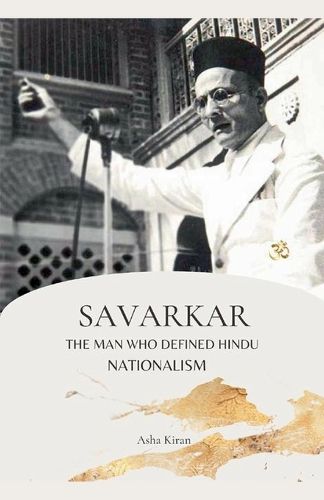Readings Newsletter
Become a Readings Member to make your shopping experience even easier.
Sign in or sign up for free!
You’re not far away from qualifying for FREE standard shipping within Australia
You’ve qualified for FREE standard shipping within Australia
The cart is loading…






This title is printed to order. This book may have been self-published. If so, we cannot guarantee the quality of the content. In the main most books will have gone through the editing process however some may not. We therefore suggest that you be aware of this before ordering this book. If in doubt check either the author or publisher’s details as we are unable to accept any returns unless they are faulty. Please contact us if you have any questions.
Vinayak Damodar Savarkar, byname Vir or Veer, (born May 28, 1883, Bhagur, India-died Feb. 26, 1966, Bombay [now Mumbai]), Hindu and Indian nationalist and leading figure in the Hindu Mahasabha ("Great Society of Hindus"), a Hindu nationalist organization and political party. Savarkar's political philosophy was quite unique as it had elements of various ethical, theological, and philosophical theories. In other words, his political philosophy was basically a mixture of humanism, rationalism, universalism, positivism, utilitarianism, and realism. He also acted against some of India's social evils, such as caste discrimination and untouchability that were prevalent during his time. Just before his death, Vinayak Damodar Savarkar wrote an article called 'Atmahatya Nahi Atmaarpan.' The article gave an insight on fast until death (atmaarpan) and stated that one should be allowed to end his or her life when one's main objective of life is achieved. On February 1, 1966, Savarkar declared that he would observe fast until death and refused to eat. On February 26, 1966, he breathed his last at his Bombay residence. His home and other possessions are now preserved for public display.
Contents Biography; Life and Work of Savarkar; Leader of the Hindu Mahasabha; Remembering Veer Savarkar; Ideologue of Hindutva; Swadharma and Swaraj; Associates in Social Reforms
$9.00 standard shipping within Australia
FREE standard shipping within Australia for orders over $100.00
Express & International shipping calculated at checkout
This title is printed to order. This book may have been self-published. If so, we cannot guarantee the quality of the content. In the main most books will have gone through the editing process however some may not. We therefore suggest that you be aware of this before ordering this book. If in doubt check either the author or publisher’s details as we are unable to accept any returns unless they are faulty. Please contact us if you have any questions.
Vinayak Damodar Savarkar, byname Vir or Veer, (born May 28, 1883, Bhagur, India-died Feb. 26, 1966, Bombay [now Mumbai]), Hindu and Indian nationalist and leading figure in the Hindu Mahasabha ("Great Society of Hindus"), a Hindu nationalist organization and political party. Savarkar's political philosophy was quite unique as it had elements of various ethical, theological, and philosophical theories. In other words, his political philosophy was basically a mixture of humanism, rationalism, universalism, positivism, utilitarianism, and realism. He also acted against some of India's social evils, such as caste discrimination and untouchability that were prevalent during his time. Just before his death, Vinayak Damodar Savarkar wrote an article called 'Atmahatya Nahi Atmaarpan.' The article gave an insight on fast until death (atmaarpan) and stated that one should be allowed to end his or her life when one's main objective of life is achieved. On February 1, 1966, Savarkar declared that he would observe fast until death and refused to eat. On February 26, 1966, he breathed his last at his Bombay residence. His home and other possessions are now preserved for public display.
Contents Biography; Life and Work of Savarkar; Leader of the Hindu Mahasabha; Remembering Veer Savarkar; Ideologue of Hindutva; Swadharma and Swaraj; Associates in Social Reforms